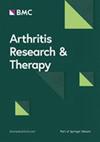抵抗素通过CAP1/PKA/CREB上调代谢综合征相关膝骨性关节炎滑膜细胞的脂肪酸氧化,促进炎症和分解代谢
IF 4.6
2区 医学
Q1 Medicine
引用次数: 0
摘要
代谢综合征(MetS)是一种以低度炎症和能量代谢紊乱为特征的综合征,被认为是膝骨关节炎(KOA)的重要系统性危险因素。我们前期研究发现,MetS-OA患者血清抵抗素蛋白水平与代谢紊乱程度呈正相关。然而,抵抗素是否促进KOA滑膜炎的进展及其潜在机制尚不清楚。本研究主要探讨KOA合并MetS患者的成纤维细胞样滑膜细胞(FLS)是否存在促进炎症和分解代谢表型的代谢紊乱,以及抵抗素在MetS-KOA-FLS中的作用和机制。比较分析女性met -associated KOA (MetS-KOA)和非MetS-KOA (nMetS-KOA)的滑膜和FLS,以检测炎症、分解代谢和糖脂代谢的差异。以met - koa血清刺激nMetS-KOA-FLS,检测MetS微环境对nMetS-KOA-FLS炎症、分解代谢和糖脂代谢的影响。抵抗素刺激MetS-KOA-FLS,探讨抵抗素对MetS-KOA-FLS炎症和分解代谢的影响及其具体机制。与nMetS-KOA-FLS相比,MetS-KOA-FLS表达更高的炎症相关因子和分解代谢酶,具有更强的粘附和侵袭能力。发现抵抗素是met - koa患者血清和内环境中的一个重要因素,它介导了两组之间脂肪酸氧化(FAO)的差异。抵抗素通过CAP1激活PKA/CREB通路,上调FAO,促进MetS-KOA-FLS的炎症和分解代谢表型。本研究从代谢角度阐明了MetS引起滑膜炎的机制,为MetS- koa的进一步研究和治疗提供了新的思路。本文章由计算机程序翻译,如有差异,请以英文原文为准。
Resistin upregulates fatty acid oxidation in synoviocytes of metabolic syndrome-associated knee osteoarthritis via CAP1/PKA/CREB to promote inflammation and catabolism
Metabolic Syndrome (MetS), as a syndrome characterized by low-grade inflammation and energy metabolism disorders, is considered to be an important systemic risk factor for knee osteoarthritis (KOA). Our previous study showed that the protein level of serum resistin was positively correlated with the degree of metabolic disorder in MetS-OA. However, whether Resistin promotes the progression of KOA synovitis and the underlying mechanisms remain unclear. This study mainly investigateswhether there were metabolism disorder which promote inflammatory and catabolic phenotype in fibroblast-like synoviocytes (FLS) from KOA patients with MetS (MetS-KOA-FLS), and the roles and mechanisim of resistin in MetS-KOA-FLS. Comparative analysis of synovium and FLS from MetS-associated KOA (MetS-KOA) and non-MetS-associated KOA (nMetS-KOA) of females to detect the differences in inflammation, catabolism and glycolipid metabolism. Serum from MetS-KOA stimulated nMetS-KOA-FLS to detect the effect of MetS microenvironment on inflammation, catabolism and glycolipid metabolism of nMetS-KOA-FLS. Resistin stimulated MetS-KOA-FLS to explore the effect of resistin on inflammation and catabolism of MetS-KOA-FLS and its specific mechanism. Compared with nMetS-KOA-FLS, MetS-KOA-FLS expressed higher inflammatory related factors, catabolic enzymes, and showed stronger adhesive and invasive ability. Resistin was found to be an important factor in the serum and internal environment of MetS-KOA patients, and it mediated the differences in fatty acid oxidation (FAO) between the two groups. Resistin activated the PKA/CREB pathway through CAP1 and upregulated FAO, promoting the inflammatory and catabolic phenotype of MetS-KOA-FLS. This study clarifies the mechanism by which MetS causes synovitis from a metabolic perspective and provides new ideas for further research and treatment of MetS-KOA.
求助全文
通过发布文献求助,成功后即可免费获取论文全文。
去求助
来源期刊

Arthritis Research & Therapy
RHEUMATOLOGY-
CiteScore
8.60
自引率
2.00%
发文量
261
审稿时长
14 weeks
期刊介绍:
Established in 1999, Arthritis Research and Therapy is an international, open access, peer-reviewed journal, publishing original articles in the area of musculoskeletal research and therapy as well as, reviews, commentaries and reports. A major focus of the journal is on the immunologic processes leading to inflammation, damage and repair as they relate to autoimmune rheumatic and musculoskeletal conditions, and which inform the translation of this knowledge into advances in clinical care. Original basic, translational and clinical research is considered for publication along with results of early and late phase therapeutic trials, especially as they pertain to the underpinning science that informs clinical observations in interventional studies.
 求助内容:
求助内容: 应助结果提醒方式:
应助结果提醒方式:


